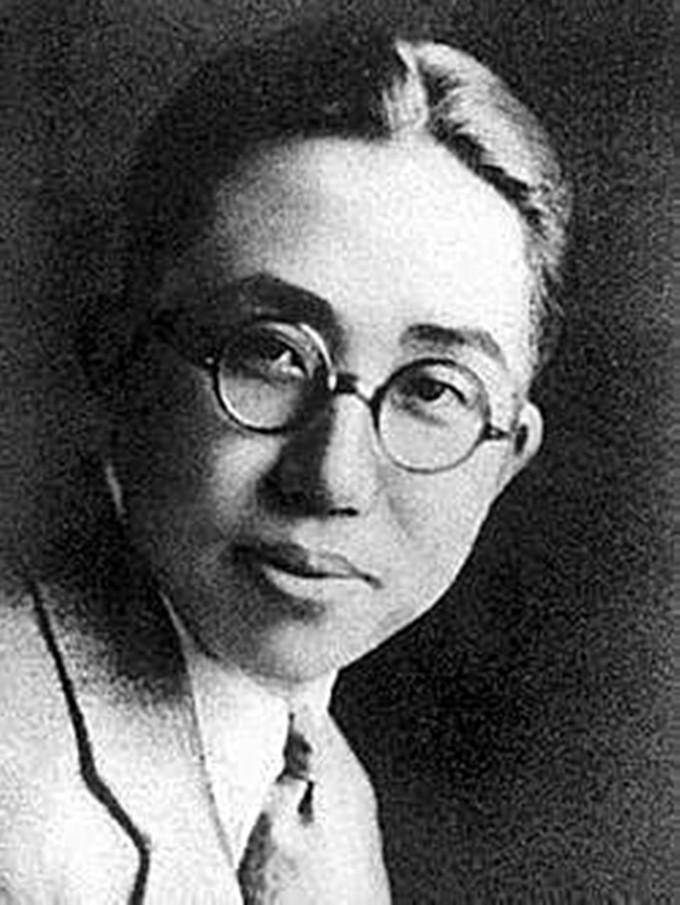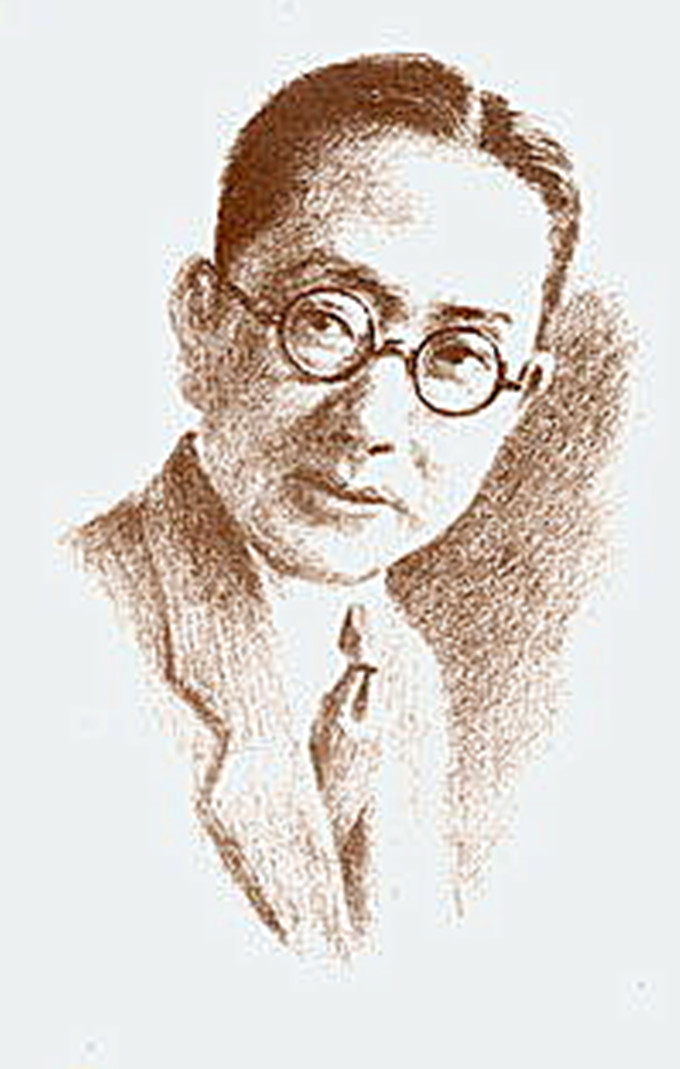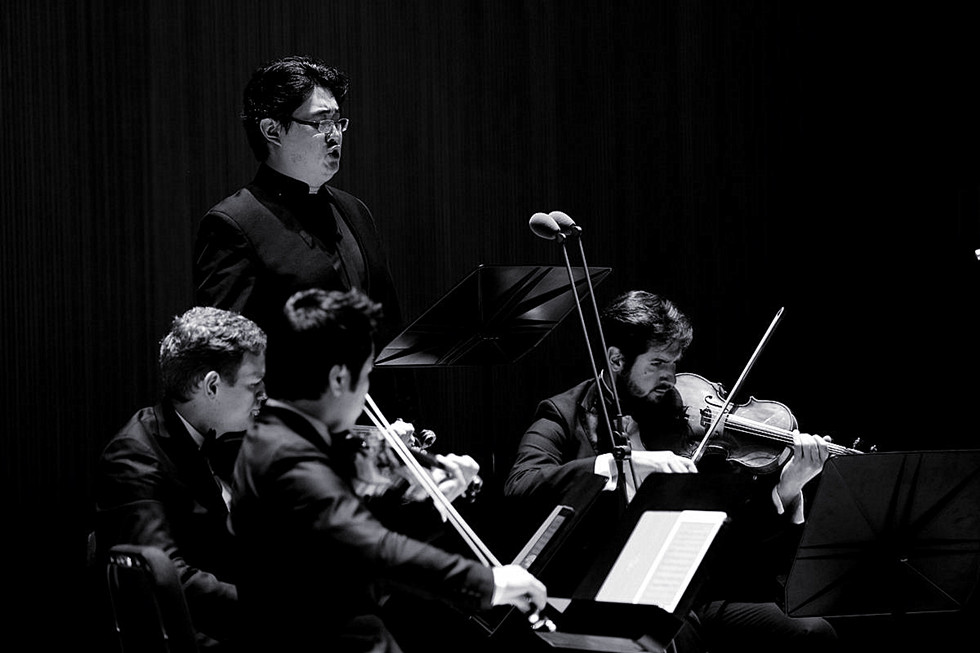| |
|
|
|
|
|
|
|
|
|
|
| |
| |
 |
|
| |
田润德
编译文/图 2020-03-23 19:36 |
|
| |
|
|
|
|
| |
 |
|
|
|
| |
黄自(Huang
Zi 1904-1938) |
|
|
|
| |
|
|
|
|
| |
陈佐湟指挥贵阳交响乐团指挥演奏黄自
《 怀旧序曲 》 |
|
|
|
| |
Huang Zi - Overture"In Memoriam" |
|
|
|
| |
|
|
|
|
| |
音乐历史上的今天
1904年3月23日(甲辰年)黄自(1904-1938)出生。
黄自(1904-1938)字今吾,江苏川沙(今属上海市)人。是中国30年代重要作曲家,音乐教育家,早年在美国欧伯林学院及耶鲁大学音乐学校学习作曲。1929年回国,先后在上海沪江大学音乐系、国立音专理论作曲组任教,并兼任音专教务主任,热心音乐教育事业,培养了许多优秀音乐人才。黄自是中国早期音乐教育影响最大的奠基人。
1904年3月23日出生于江苏省川沙县(今属上海市浦东新区),父亲黄洪培(号济北)是黄炎培堂兄,是当地经纪毛巾厂的经理,辛亥革命后参与地方政事,1923年被选为川沙县议事会副议长和交通局副局长。母亲陆梅先,又名开群,是一位才德兼备的知识妇女。
1910年入上海初级小学。
1911年转入浦东中学附属小学就读。
1916年考入北京清华学校,开始接触西方音乐,入学后积极参加学校音乐社团活动,成为清华园内“大名鼎鼎之‘音乐家'”。在校学习钢琴和声乐。
1924年秋,黄自以优异成绩毕业于清华学校,获庚子赔款赴美留学,入俄亥俄州欧伯林学院学习心理学,同时选修了乐理、视唱听写和键盘和声等音乐课程。
1926年,荣获文学士学位,同时以“学行并茂”,被校方提名为全美优秀大学生学术荣誉组织——法·培德·嘉派学会(Phi Beta
Kappa)会员。
1928年9月,黄自转学至耶鲁大学音乐学校继续学习,主攻理论作曲。
1929年以毕业作品《怀旧》序曲获得音乐学士学位,并在耶鲁大学音乐学校的毕业音乐会上公演。同年8月,黄自取道欧洲游历英、法、德、荷、意等国后回国,旋即应聘为上海沪江大学音乐教授,并在上海国立音乐专科学校兼课。
1930
年辞去沪江大学职务,应上海音专校长萧友梅博士之聘请,任该校教授兼教务主任。学校工作之余还从事创作、理论等方面的活动,并先后担任上海工部局音乐委员、教育部音乐教育委员会和中小学音乐教材编订委员会委员,中央文化事业计划委员会音乐研究会委员以及音乐艺文社《音乐杂志》和《新夜报》副刊“音乐周刊”主编,又发起创办全部由中国人组成的上海管弦乐团,并任团长。
1930年12月24日,黄自和汪颐年女士在上海东方饭店结婚。黄炎培作贺词。
1931年“九·一八”事变后,黄自与音专师生组织“抗日救国会”,赴浦东等地宣传抗日并为东北义勇军募捐。黄自作词谱曲创作了我国最早以抗日救亡为题材的合唱作品《抗敌歌》(后由韦瀚章填写了第二段歌词)。同年11月9日,《抗敌歌》由音专学生在广播电台首次播唱,并由胜利公司灌成唱片。
1932年“一·二八”事变爆发,黄自又创作了四部混声合唱《旗正飘飘》(韦瀚章词),于10月8日由音专学生在广播电台首次播唱。《旗正飘飘》成为抗战前后音乐会中的保留。
1932-1935年,黄自受商务印书馆委托,和应尚能、张玉珍、韦瀚章等人,一同编写音乐教材《复兴初中音乐教科书》(全国采用),由教育着手,稳住了中国音乐发展走向。这部教材从1933年至1936年期间,续印本多达11版之多,对当时音乐教育有重要影响。
1933年3月底,黄自率领音专师生在杭州举行了两场“鼓舞敌忾后援音乐会”,并亲自主持报幕,音乐会以《抗敌歌》、《旗正飘飘》为压轴曲目。
1935年10月,黄自为进步影片《都市风光》创作了片头音乐《都市风光幻想曲》,由帕契指挥上海工部局交响乐团录制成唱片。
1935年11月1日,黄自发起创办第一个由中国人组成的上海管弦乐团。由黄自、谭小麟任正副团长,吴伯超、李惟宁任正副指挥。
1937年全面抗战爆发后,黄自辞去教务主任之职务,集中精力从事教学和编写《音乐史》及《和声学》两部论著。
1938年5月9日,黄自因患伤寒病逝于上海红十字会医院。临终前,他对夫人汪颐年女士说:“你快去请医生,我不能就此死去,还有半部音乐史没有写完呢!”终年34岁。
今日视频:1、陈佐湟指挥贵州交响乐团演奏黄自管弦乐《怀旧序曲
》;2、沈洋和他的朋友们——纪念黄自诞辰110周年音乐会
2014年。 |
|
|
|
| |
 |
|
| |
黄自(Huang
Zi 1904-1938) |
|
|
|
| |
Today in the
history of music
Huang zi (1904-1938) was born on March 23, 1904
Huang zi (1904-1938) styled jinwu, was born in chuansha, jiangsu
province (today's Shanghai).He is an important Chinese composer and
music educator in the 1930s. He studied composition at oberlin college
and Yale university music school in his early years.In 1929, he came
back to China and successively taught in the music department of
Shanghai hujiang university and the theoretical composition group of
national conservatory of music, and concurrently served as the director
of the academic affairs of the conservatory. He was enthusiastic about
music education and cultivated many excellent musical talents.Huang zi
is the most influential founder of early music education in China.
Born on March 23, 1904 in chuansha county, jiangsu province (today's
pudong new area in Shanghai), his father huang hongpei (no.Mother lu
meixian, also known as kaiqun, is a talented and virtuous intellectual
woman.
He entered Shanghai primary school in 1910.
In 1911, he transferred to the primary school attached to pudong middle
school.
In 1916, he was admitted to tsinghua university in Beijing and began to
get in touch with western music. After entering the university, he
actively participated in the school's music club activities and became a
"famous musician" in tsinghua university.I studied piano and vocal music
in school.
In the autumn of 1924, huang zi graduated from tsinghua university with
honors and went to the United States to study psychology with the boxer
indemnity. He went to oberlin college in Ohio to study psychology and
took music theory, solfeggio dictation and keyboard harmony as his
elective courses.
In 1926, he received a bachelor of arts degree and was nominated as a
member of Phi Beta Kappa, an academic honor organization for outstanding
college students.
In September 1928, huang transferred to Yale university music school to
continue his studies, focusing on theoretical composition.
In 1929, he received his bachelor of music degree with the graduation
work "nostalgia" and performed in the Yale music school's graduation
concert.In August of the same year, huang returned to China after
traveling to Britain, France, Germany, the Netherlands and Italy through
Europe. He was soon employed as a professor of music at Shanghai hujiang
university and took part-time courses at Shanghai national music
academy.
In 1930, he resigned from hujiang university and became a professor and
director of academic affairs at the invitation of Dr. Xiao youmei,
President of Shanghai polytechnic school.School work is still engaged in
creation and theory, and has served as member of Shanghai municipal
music, the Ministry of Education music education committee and the
primary and secondary school music teaching material compilation
committee, music institute career planning committee of the central
culture and music art club music magazine and new YeBao supplement
"music weekly" editor in chief, and launched all made up of the Chinese
orchestra in Shanghai, and as a leader.
On December 24, 1930, huang zi and wang yi nian got married in Shanghai
Oriental hotel.Huang yanpei made a speech of congratulation.
After the "September 18" incident in 1931, huang zi, together with
teachers and students of the polytechnic school, organized the
"anti-japanese national salvation congress", went to pudong and other
places to publicize the anti-japanese and raise money for the northeast
volunteers.Huang zi wrote lyrics and music to create the earliest chorus
work "song of resistance to the enemy" with the theme of anti-japanese
and national salvation (the second lyric was filled in by wei hanzhang
later).On November 9 of the same year, "song of resistance against the
enemy" was first played on the radio by the phonologist and recorded by
the victory company.
In 1932, "January 28" incident broke out, and huang zi created four
mixed chorus "flag is flying" (wei hanzhang ci), which was first played
on the radio station on October 8 by the students of the school of
music."The flag is flying" became a reservation in concerts before and
after the war.
From 1932 to 1935, huang zui was commissioned by the commercial press
and worked with ying shangneng, zhang yuzhen, wei hanzhang and others to
compile the music textbook Renaissance junior high school music textbook
(adopted throughout the country), which started from education and
stabilized the development trend of Chinese music.From 1933 to 1936,
there were as many as 11 editions of this textbook, which had an
important influence on music education at that time.
At the end of March 1933, huang zi led the teachers and students to hold
two "concert to encourage the enemy" in hangzhou, and personally
presided over the curtain, the concert with "song against the enemy",
"flag is flying" as the finale.
In October 1935, huang zi composed the opening music "fantasia of urban
landscape" for the progressive film "urban landscape", which was
recorded by the Shanghai bureau of industry and technology orchestra
under the direction of patchi.
On November 1, 1935, huang zi initiated the establishment of the first
Shanghai orchestra composed of Chinese.Huang zi, tan xiaolin as chief
and deputy head, wu po-chao, li weining as chief and deputy command.
After the outbreak of the war of resistance against Japanese aggression
in 1937, huang zi resigned from his post as the dean of academic affairs
and concentrated on teaching and writing the history of music and
harmony acoustics.
On May 9, 1938, huang zi died of typhoid fever in Shanghai Red Cross
hospital.Before dying, he said to his wife, Ms. Wang nian: "you go to
the doctor, I can't die at this point, there is still half of the music
history is not written!"He was 34 years old.
Today's video: 1. Chen zuohuang conducts guizhou symphony orchestra to
perform huang zi's orchestral prelude of nostalgia;2. Shen Yang and his
friends -- concert to commemorate the 110th anniversary of huang zi's
birth in 2014. |
|
|
|
| |
|
|
|
|
| |
 |
|
| |
沈洋,汉族,低男中音,1984年3月出生于天津一个音乐世家。2000年--2003年就读于天津音乐学院附中;2003年起就读于上海音乐学院,2007年赴美国茱莉亚学院及纽约大都会歌剧院青年艺术家培训中心学习,先后取得上海音乐学院音乐文学硕士学位、纽约茱莉亚学院歌剧艺术家文凭。现为美国大都会歌剧院和美国IMG国际艺术家管理公司签约歌唱家,上海音乐学院声乐歌剧系教师。被聘为美国霍普金斯大学皮博迪音乐学院、天津音乐学院、沈阳音乐学院、杭州师范大学音乐学院客座教授。 |
|
|
|
| |
Shen Yang, han nationality, low
baritone, was born in March 1984 in tianjin into a
musical family.From
2000 to 2003, studied in tianjin conservatory of
music affiliated high school;Since
2003, he has been studying at Shanghai conservatory
of music. In 2007, he went to juilliard school in
the United States and the Metropolitan Opera young
artist training center in New York.Now
he is a contract singer for the Metropolitan Opera
and IMG international artist management company, and
a teacher of the vocal opera department of Shanghai
conservatory of music.He
has been a visiting professor at the Peabody school
of music, Johns Hopkins university, tianjin
conservatory of music, shenyang conservatory of
music, hangzhou normal university.
|
|
|
|
| |
|
|
|
|
| |
沈洋和他的朋友们——纪念黄自诞辰110周年音乐会 2014年
|
|
|
|
| |
曲目依次如下:
南乡子·登京口北固亭怀古 6' 09
卜算子·黄州定慧院寓居作 7' 54
点绛唇·赋登楼 9' 58
淮南民谣·古谣 14' 19
春风 15' 9
下江陵 18' 18
春思曲 20' 06
燕语 22' 35
玫瑰三愿 24' 20
西风的话 26' 21
本事 28' 37
踏雪寻梅 30' 38
三样早 31' 29
牛 32' 10
赠前敌将士 38' 48
长城谣 (刘雪庵曲) 39' 55
春天里 (贺绿汀曲) 43' 32
岁月悠悠 (江定仙曲) 45' 52
红豆词 49' 24
山中 52' 18
嘉陵江上 (贺绿汀曲) 54' 55
花非花 58' 00
思乡 1'00''00
|
|
|
|
| |
|
|
|
|
| |
未得原作者编者授权严禁转载www.mt77.com任何内容 |
|
|
|
|
|
|
|
|
|
|
|
|
|
|


